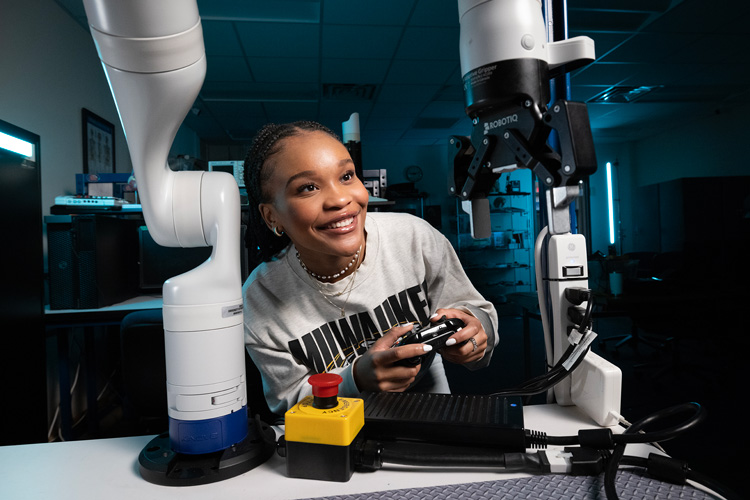
UWM student Georgina Monese is pursuing her bachelor’s in biomedical engineering, driven to use new technology to help people and improve medicine. (UWM Photo/Troye Fox)
UW-Milwaukee wasn’t Georgina Monese’s first choice. She started her college journey at UW-Madison to study astrophysics, but in the back of her mind was biomedical engineering. She’d been introduced to the subject through a high school program, and Monese loved the idea of using technology to help people in a hands-on way.
Biomedical engineers typically work in health care facilities, research institutions or medical labs, where their focus can range from medical device innovation to drug development.
“With biomedical engineering, you can do a mix of both with the research and development side,” she said.
But there was a problem — “Madison didn’t feel like home to me,” Monese said. A combination of wanting to dive into research faster and searching for stronger community led Monese to UW-Milwaukee. There was a family connection, too.
“My mom and older sister went to UWM and loved it, so I’d already been to campus many times,” she said.
As for research and community? Monese found both right away. A 45-minute conversation with Ramona Sledge, a success coach in the Black Student Cultural Center, led Monese to apply for a research-centered internship at the Medical College of Wisconsin.
“Ramona barely knew me at the time, but I could see that she cared so much about me and my future already. She gave me the confidence boost I needed to apply,” Monese said. But being accepted for the internship was just the beginning.
Using AI to dig into medical data
As a research fellow at the Medical College of Wisconsin, Monese worked in the AN.AI (Accelerated iNsight. Augmented Intelligence) Lab with Anai Kothari, a surgical oncologist, and Adhit Ramamurthi, a surgical resident from the Medical College.
Monese looked at how AI technology allows computers to better understand and analyze the language humans use. From there, hospital data (from a patient’s condition to a surgeon’s experience) can be used to predict the length of medical surgery cases. That AI-assisted analysis can ripple outward into true, tangible benefits to patients and medical workers alike. For example, hospitals can use the information to more efficiently plan surgery schedules while also minimizing patient wait times.
“It was great to contribute to the lab’s mission of advancing AI-driven solutions in medicine,” Monese said. “And to apply what I’d been learning in school was very fulfilling.”
Turning to the future
Monese is a little more than halfway through her UWM journey, but she already has her eyes on the future. She hopes to continue studying and next earn a graduate degree, specializing in neural engineering, which applies engineering principles to understand, repair and enhance the nervous system.
Monese credits the experiences she’s had at UWM so far — ranging from career fairs and research presentations to meaningful mentorship from faculty — and how they’ve set her up for success in college and beyond. She also hopes to pay it forward one day. “As a Black woman in STEM, I want to inspire and mentor future generations of women of color,” she said.
Her current aspirations include working in product development within the neural engineering field. She wants to work on different devices aimed at assisting people with nervous system disorders, such as Parkinson’s disease and multiple sclerosis.
“It’s always been a dream of mine to use technology to advance health care and save lives,” she said. “At UWM, it doesn’t feel like a dream anymore. It feels like reality.”
Written by Molly Jasinski
Link to original story: https://uwm.edu/news/biomedical-engineering-student-uses-ai-to-analyze-medical-data/
